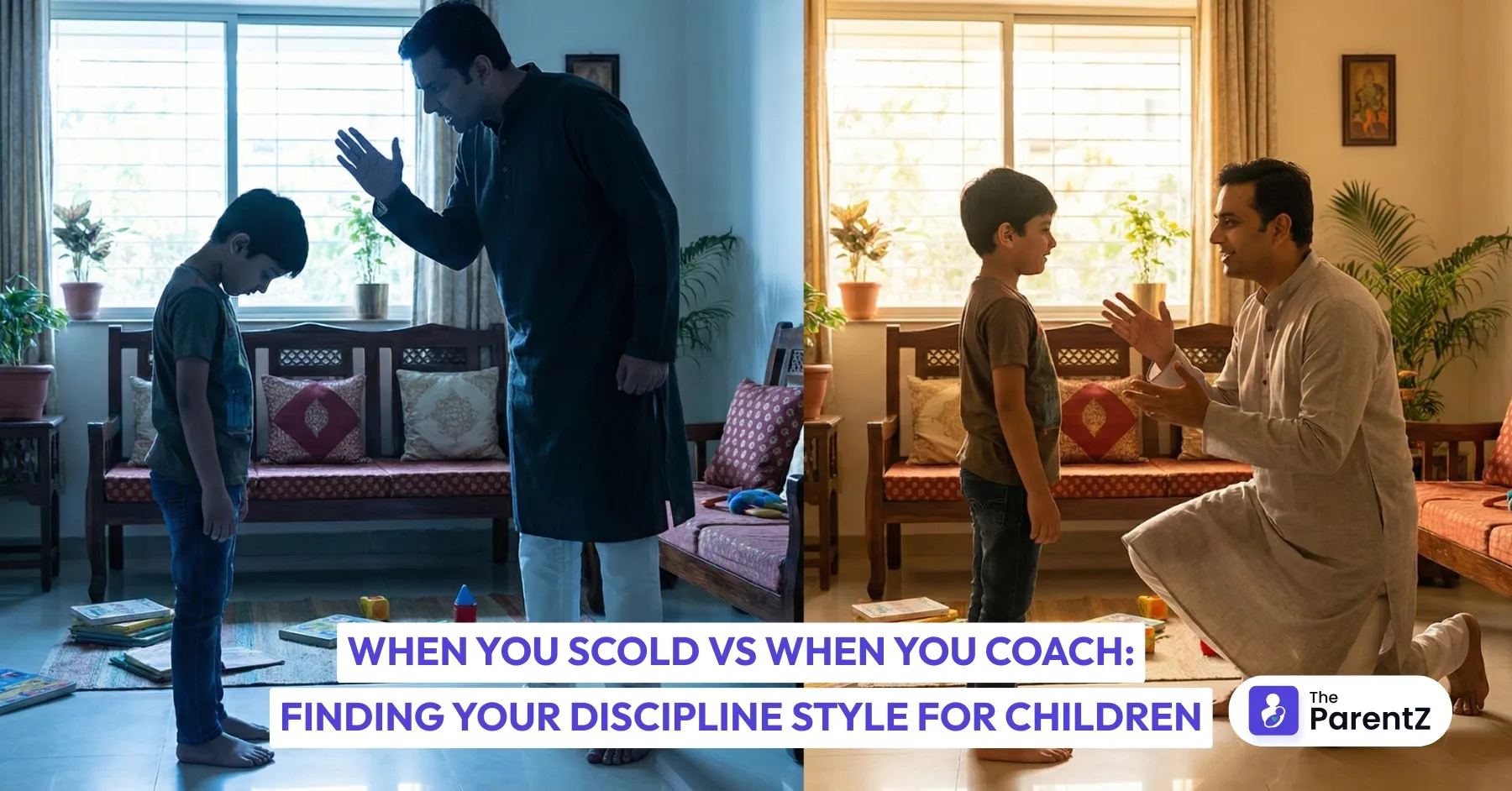It's 7:30 AM. Your child has spilled milk all over the kitchen floor. Again. You're already running late, and now there's a puddle spreading toward the carpet.
What comes out of your mouth?
"How many times have I told you to be careful? Why can't you just hold the glass properly!"
Or maybe it's more like: "Okay, accidents happen. Let's figure out how to hold the glass so this doesn't happen again."
Same situation. Two completely different responses. Both are totally normal. We've all been in both places.
What Scolding Really Looks Like
Scolding isn't always yelling or losing your temper. Sometimes it's that sharp tone. That disappointed look. Those words that focus on what went wrong and how frustrated you are about it.
"You never listen." "Why do you always do this?" "I'm so tired of telling you the same thing."
When we scold, we're usually pointing out the mistake and showing our disappointment. We might raise our voice. We might use words like "always" and "never." And what we need to understand is that we're not bad parents for doing this. We're human. We're tired. We're stressed. And sometimes, we just snap.
What Coaching Actually Means
Coaching sounds fancy, but it's really not. It's just taking a breath and switching your focus from the problem to the solution. From what went wrong to what we can learn.
Instead of "You broke another toy! You're so careless!" it becomes "This toy broke. What do you think happened? How can we be more gentle next time?"
Coaching is when you become their guide instead of their judge. You're still addressing what happened, but you're doing it in a way that teaches rather than shames.
How Kids React, And Why It Matters
Think about the last time someone criticized you at work or in front of family. Remember that feeling? That's what your child feels when they're scolded.
When kids are scolded, they often:
- Shut down and stop listening after the first few words
- Feel ashamed or defensive
- Focus on how bad they feel, not on what they did wrong
- Sometimes lie or hide things next time to avoid being scolded
But when kids are coached, something different happens:
- They actually hear what you're saying
- They feel safe to admit mistakes
- They learn problem-solving skills
- They're more likely to come to you next time instead of hiding
Why We Choose Scolding (And It's Okay to Admit It)
Let's talk about why scolding happens, because understanding yourself is half the battle.
You scold when you're overwhelmed. When you've said the same thing fifteen times. When you're worried about being late. When you're afraid, they'll never learn. When your own parents scolded you and now it's just automatic.
Sometimes you scold because you genuinely believe it works. "My parents were strict with me, and I turned out fine." Maybe you think kids need to know when they've really messed up.
And sometimes you're just exhausted, and coaching takes more energy than you have in that moment.
All of this is valid. Parenting is hard.
Why Coaching Works Better (Even When It's Harder)
We know that coaching takes more time and energy in the moment. But it saves you so much in the long run.
When you coach, you're teaching your child how to think, not just what to think. You're building their confidence instead of chipping away at it. You're creating a relationship where they actually want to listen to you.
Think long-term. Do you want a teenager who hides everything from you because they're scared of your reaction? Or one who comes to you with problems because they know you'll help them figure it out?
Finding Your Balance (Because Perfect Doesn't Exist)
You don't have to be a coaching parent 100% of the time. That's not realistic.
Some days you'll scold. You'll lose your patience. You'll say things you wish you hadn't. And then you'll feel guilty. Welcome to parenting.
The goal isn't perfection. It's awareness. It's trying. It's maybe choosing to coach when you can, and being gentle with yourself when you can't.
You can even tell your kid, "I'm sorry I yelled earlier. I was frustrated, but that wasn't the best way to handle it. Let's talk about what happened."
Kids need to see that adults make mistakes too. And that we can apologize and do better.
Small Shifts That Make a Big Difference
You don't have to overhaul your entire parenting style tomorrow. Just try this:
- Next time something happens, pause for three seconds. Take a breath. Ask yourself: "Do I want to react or respond?"
- Change "Why did you do that?" to "What happened here?"
- Replace "You always..." with "I noticed that..."
- See your child as someone learning, not someone messing up.
That's it. Small shifts. Not perfection.
Conclusion
Your child needs to know their behavior has consequences. But they also need to feel safe, heard, and loved, especially when they mess up.
Scolding might stop the behavior in the moment. Coaching teaches them for a lifetime.
And on the days when you do scold, just remember that tomorrow is a new day. Every moment is a chance to start again.
You're doing better than you think. Keep going.






Be the first one to comment on this story.